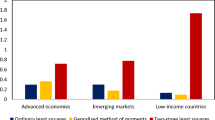Abstract
Based on a panel data model, Giavazzi, Jappelli and Pagano (2000, European Economic Review 44, 1259–1289) recently found evidence that national saving in OECD countries responds nonlinearly to fiscal policy, the nonlinearity being associated with the size and persistence of the fiscal impulse. The existence of this nonlinearity would have important policy implications because it implies that the short-run costs of a fiscal consolidation program are lower the larger and more persistent it is. However, this paper shows that their finding is not robust, one reason being the inadequacy of the slope homogeneity assumption implicit in their panel model and another reason being their reliance on an implausibly large number of episodes of large and persistent fiscal impulses.
Similar content being viewed by others
References
van Aarle B, Garretsen H (2003) Keynesian, Non-Keynesian or no effects of fiscal policy changes? The EMU case. J Macroecon 25:213–240
Alesina A, Ardagna S (1998) Tales of fiscal adjustment. Econ Policy 27:487–545
Alesina A, Perotti R (1995) Fiscal expansions and adjustments in OECD countries. Econ Policy 21:207–248
Alesina A, Perotti R (1996) Reducing budget deficits. Swedish Econ Policy Rev 3:113–134
Alvarez J, Arellano M (1998) The Time Series and Cross-Section Asymptotics of Dynamic Panel Data Estimators. CEMFI Working Paper 9808. Madrid
Blanchard OJ (1990) Comment on “Francesco Giavazzi and Marco Pagano, can severe fiscal contractions be expansionary?” In: Blanchard OJ, Fischer S (eds) NBER macroeconomics annual. MIT Press, Cambridge, MA
Drazen A (1990) Comment on “Francesco Giavazzi and Marco Pagano, can severe fiscal contractions be expansionary?”. In: Blanchard OJ, Fischer S (eds) NBER macroeconomics annual. MIT Press, Cambridge, MA
Giavazzi F, Jappelli T, Pagano M (2000) Searching for Non-Linear Effects of Fiscal Policy: Evidence from Industrial and Developing Countries. Euro Econ Rev 44:1259–1289
Giavazzi F, Pagano M (1990) Can severe fiscal contractions be expansionary? In: Blanchard OJ, Fischer S (eds) NBER macroeconomics annual. MIT Press, Cambridge MA
Giavazzi F, Pagano M (1996) Non-Keynesian effects of fiscal policy changes: international evidence and the Swedish experience. Swedish Econ Policy Rev 3:67–103
Haque NU, Pesaran MH, Sharma S (2000) Neglected heterogeneity and dynamics in cross-country savings regressions. In: Krishnakumar J, Ronchetti E (eds) Panel data econometrics: future directions. Elsevier, Amsterdam
Heylen F, Everaert G (2000) Success and Failure of Fiscal Consolidation in the OECD: A Multivariate Analysis. Publ Choice 105:103–124
Hoeppner F, Wesche K (2000) ‘Non-Linear Effects of Fiscal Policy in Germany: A Markov-Switching Approach’. Bonn Econ Discussion Paper 9/2000. University of Bonn
Hogan V (2004) Expansionary fiscal contractions? evidence from panel data. Scand J Econ 106:647–659
Kamps C (2001) Fiscal Consolidation in Europe: Pre- and Post-Maastricht. Kiel Working Paper 1028. Institute for World Economics, Kiel
Neumann T (2001) Expansionary fiscal consolidations: evidence from time-varying coefficient VARs for Germany. Appl Econ Quart 47:139–162
Newey WK, West KD (1987) A simple, positive semi-definite, heteroscedasticity and autocorrelation consistent covariance matrix. Econometrica 55:703–708
OECD (1996) The experience with fiscal consolidation in OECD countries. Econ Outlook 59:33–41
OECD (2004a) Economic outlook 75. June. Paris
OECD (2004b) Annual National Accounts—Volume 1, 1970-2002 (2003 prov.) – Main Aggregates, Vol. 2004 release 04. Paris
Perotti R (1999) Fiscal policy in good times and bad. Quart J Econ 114:1399–1436
Sarantis N, Stewart C (2001) Saving behaviour in OECD countries: evidence from panel cointegration tests. Manchester School 69:22–41
Sutherland A (1997) Fiscal crises and aggregate demand: can high public debt reverse the effect of fiscal policy? J Publ Econ 65:147–162
Acknowledgements
This paper was written while I was an Economist in the Business Cycles Department of the Kiel Institute for World Economics. I would like to thank three anonymous referees, my former colleagues at the Kiel Institute and seminar participants at the 2001 EEA and IIPF annual meetings as well as Jörg Döpke, M. Lee Greene and Roberto Perotti for helpful comments on an earlier version of this paper (Kamps 2001). This views expressed in this paper do not necessarily reflect those of the Kiel Institute or the European Central Bank.
Author information
Authors and Affiliations
Corresponding author
Rights and permissions
About this article
Cite this article
Kamps, C. Are the effects of fiscal policy really nonlinear? A note. Empirica 33, 113–125 (2006). https://doi.org/10.1007/s10663-006-9010-3
Published:
Issue Date:
DOI: https://doi.org/10.1007/s10663-006-9010-3




